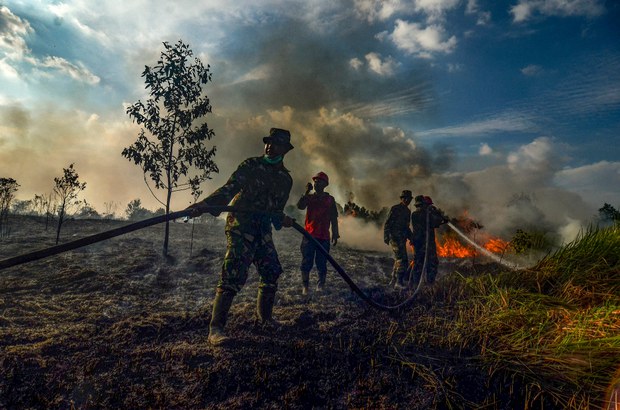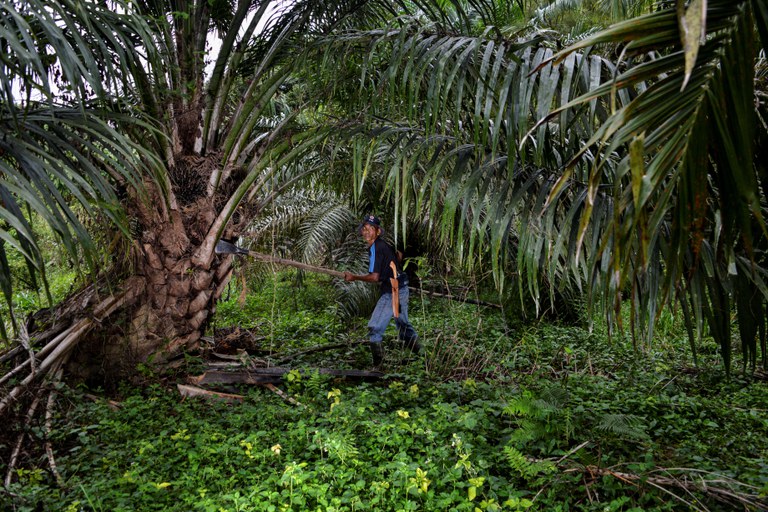Indonesian Activists: New Rules on Palm Oil Plantations Could Threaten Forests’ Survival
2021.09.23
Jakarta
 Forest and land fire task force officers try to douse a fire with water pipes at a palm oil plantation in Pekanbaru, in Riau province, Indonesia, July 20, 2019.
Forest and land fire task force officers try to douse a fire with water pipes at a palm oil plantation in Pekanbaru, in Riau province, Indonesia, July 20, 2019.
Environmental experts and activists are urging Indonesia’s government to extend a ban on new palm oil plantations that just expired, warning the new rules to regulate the sector – seen as pro-business – may undermine efforts to limit deforestation.
After a three-year moratorium on permits for new plantations ended Sunday, the palm-oil industry will now be regulated under a controversial jobs-related law, which will promote the expansion of plantations, according to an Indonesian forestry policy expert.
“I’m worried that regulators will churn out permits and there’s little supervision on the ground,” Hariadi Kartodihardjo, a professor of forestry policy at the Bogor Agricultural University (IPB), told BenarNews.
Six new forestry regulations pave the way for plantation expansion, legalization of plantations in native forests, and clearing of forests for infrastructure projects, he said.
“This is why it is imperative that the moratorium be extended,” he added.
In late 2020, parliament passed the so-called Jobs Creation Law that slashed dozens of regulations seen as discouraging investment, including in the forestry sector. Critics said the revisions favor businesses at the expense of the environment.
Musdhalifah Machmud, deputy minister for food and agribusiness at the Coordinating Ministry for Economic Affairs, said this week that the forestry sector, including palm oil plantations, would be regulated by the jobs law after the moratorium expired.
The end of the moratorium would not impede the government’s efforts to achieve environmental sustainability in the palm oil sector, Musdhalifah said.
“We have passed the Jobs Creation Law and Government Regulations that support it,” she told BenarNews.
“For the moratorium, we are still waiting for a direction [from the president],” Musdhalifah said when asked whether President Joko “Jokowi” Widodo would order an extension to the moratorium he decreed in 2018.
Musdhalifah did not explain how the law and the rules that it spawned could support sustainable palm oil management.
Earlier on, Environment and Forestry Minister Siti Nurbaya Bakar had said that the new legislation provided for stricter requirements for minimum forest cover.
For instance, the new regulations restrict to 100,000 hectares the plantation area that a company of a corporate group can manage across Indonesia. The previous law allowed a company up to 100,000 hectares within a province.
At the same time, though, the new law removes a stipulation that the government maintain forest cover of at least 30 percent of a land area or an island.
Back in 2018, the moratorium on new palm oil plantations – as well as the expansion of existing ones – was instituted to improve the sustainability of plantations, protect the environment and support the goal to reduce greenhouse gas emissions, the government said then.
The moratorium, among other things, aimed to end the practice of clearing land by burning vegetation in order to set up lucrative palm oil and paper and pulp plantations. Experts had told BenarNews that the economic incentive to use fires was “huge.”
As it is, the thousands upon thousands of acres of Indonesian rainforest already converted into giant palm oil plantations depleted not only biodiversity, they reduced a crucial source of oxygen.
On top of that, huge blazes emitted toxic greenhouse gases and even spread to protected forestlands. The resulting heavy haze often crosses national boundaries and engulfs other Southeast Asian countries.

A worker clears a tree at a palm oil plantation in Sampoiniet, Aceh province, Indonesia, March 7, 2021.
On Thursday morning (local time), Jokowi took to the world stage where he proclaimed that Indonesia had succeeded in reducing the number of forest fires by 82 percent throughout 2020.
At the same time, the rate of deforestation fell by 75 percent, the lowest in 20 years, he said in a pre-recorded speech to the United Nations General Assembly.
“Indonesia is aware of our strategic place on climate change. Thus, we will continue to work hard to fulfill our commitments,” the Indonesian president said.
In March, the government said Indonesia had lost 115,000 hectares of forest during 2019-2020, down from 462,000 hectares the previous year.
In his speech at the virtual G20 Summit last November, Jokowi said the Jobs Creation Law would have a positive impact on the environment.
“The law also provides protection for tropical forests, as a bulwark against climate change,” he said then.
That was incorrect, according to Adrianus Eryan, the head of forestry division at the Indonesian Center for Environmental Law (ICEL).
“The Jobs Creation Law paves the way for the legalization of business activities in forest areas, including oil palm. This contradicts the goal of the moratorium [on permits for new palm oil plantations],” Adrianus told BenarNews.
As of last year, 3.4 million hectares of oil palm trees were planted in designated native forests, where agriculture is forbidden, data from the Ministry of Agriculture shows.
According to an environmental non-profit group, the Kehati Foundation, operators who illegally encroached on about half that land had been issued permits by local governments to do so. Under the new regulations, they may now become fully legal.
Indonesia has set the target of reducing greenhouse gas emissions by 41 percent by 2030 with international support.
That will not be possible without the palm oil moratorium, said Teguh Surya, founder of the Sustainable Madani Foundation.
Around 1.4 million hectares of natural forest could be converted into palm oil plantations in the coming years, he said.
“Aggressive palm oil expansion is a major contributor to carbon emissions,” he told BenarNews.
Tria Dianti in Jakarta and Ika Inggas in Washington contributed to this report.







